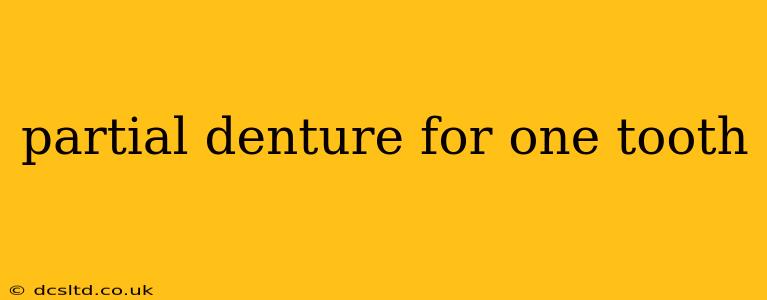Losing even a single tooth can significantly impact your smile, confidence, and ability to eat comfortably. While some might consider a dental implant the ideal solution, a partial denture for one tooth presents a viable and often more affordable alternative. This comprehensive guide explores the intricacies of this procedure, answering common questions and helping you make an informed decision.
What is a Partial Denture for One Tooth?
A partial denture, typically used for multiple missing teeth, can also be customized to replace just one. This single-tooth partial denture is a removable appliance consisting of a replacement tooth attached to a small, custom-made base that rests on your gums. The base is designed to fit snugly against your existing teeth and gums, providing stability and support for the artificial tooth. It's a more conservative approach than an implant, requiring less invasive procedures.
Is a Partial Denture for One Tooth Right for Me?
Whether a single-tooth partial denture is suitable depends on several factors. Your dentist will assess your oral health, including the condition of your surrounding teeth and gums, and the reason for tooth loss. They'll discuss the pros and cons of a partial denture versus other options like a dental implant or a dental bridge.
What are the advantages of a partial denture for one tooth?
- Cost-effective: Partial dentures are generally less expensive than dental implants.
- Less invasive: They require less preparation and surgical intervention compared to implants.
- Removable: You can remove the denture for cleaning, making oral hygiene easier.
- Quick turnaround: The process from consultation to placement is often faster than implant placement.
What are the disadvantages of a partial denture for one tooth?
- Potential for slippage: The denture might become loose or shift slightly, especially initially.
- Requires regular cleaning: You need to clean the denture meticulously to prevent bacterial growth.
- Not as strong as a natural tooth or implant: It might not be as durable or long-lasting as a dental implant.
- May affect speech: It might take some time to adjust to speaking with the denture.
How Long Does a Partial Denture for One Tooth Last?
The lifespan of a single-tooth partial denture varies depending on factors like oral hygiene, diet, and general health. With proper care, it can typically last for several years. Regular checkups with your dentist are crucial for maintenance and to address any potential issues.
How Much Does a Partial Denture for One Tooth Cost?
The cost of a single-tooth partial denture can vary significantly depending on your location, the dentist's fees, and the complexity of the procedure. It's advisable to consult with several dentists to get a range of quotes before making a decision.
How is a Partial Denture for One Tooth Made?
The process typically involves several appointments:
- Initial Consultation and Examination: Your dentist will assess your oral health and determine if a partial denture is the right option.
- Impressions: They will take impressions of your mouth to create a custom-fitted base for the denture.
- Denture Fabrication: A dental lab will create the artificial tooth and attach it to the custom base.
- Fitting and Adjustments: Your dentist will fit the denture and make any necessary adjustments to ensure a comfortable and secure fit.
Does Insurance Cover Partial Dentures for One Tooth?
Coverage for partial dentures varies depending on your dental insurance plan. Some plans may cover a portion of the cost, while others may not provide any coverage. It's best to contact your insurance provider directly to understand your specific coverage details.
What are the alternatives to a partial denture for one missing tooth?
Besides a partial denture, other options for replacing a single missing tooth include:
- Dental Implant: A titanium post surgically implanted into the jawbone to support a replacement tooth. This is the most permanent and natural-feeling option.
- Dental Bridge: A fixed replacement tooth cemented to the adjacent teeth. This requires preparation of the neighboring teeth.
By carefully considering your individual circumstances and consulting with your dentist, you can determine the best solution for restoring your smile and oral health. Remember that the information provided here is for general knowledge and should not replace professional dental advice. Always consult with a qualified dentist to discuss your specific needs and treatment options.
